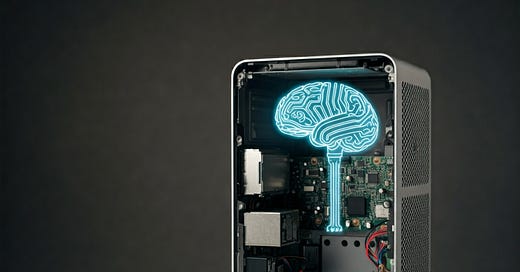AI Reading List 2: Mathematical Limitations of LLMs, A SQL Roadmap for Data Science, and Multi-Datacenter Training
Society's Backend Reading List 10-14-2024
Here’s a comprehensive AI reading list from this past week. Thanks to all the incredible authors for creating these helpful articles and learning resources.
I put one of these together each week. If reading about AI updates and topics is something you enjoy, make sure to subscribe.
Society’s Backend is reader supported. You can support my work (these reading lists and standalone articles) for 80% off for the first year (just $1/mo). You’ll also get the extended reading list each week.
A huge thanks for all supporters. 😊
What’s Happened this Past Week
If you want a good overview of this past week in AI you can check out:
- ’s weekly AI Round Up. His newsletter is worth a sub.
- ’s podcast going over AI news.
Andrew Ng’s writing in The Batch that goes over recent AI happenings and why they’re important.
Also worth knowing:
Geoffrey Hinton and John Hopfield were awarded the Nobel Prize in Physics
Google DeepMind's Demis Hassabis & John Jumper awarded Nobel Prize in Chemistry
- ’s Machine Learning From Zero is out. It’s a machine learning tensor library with 100+ pages of documentation that reads like a book. It’s an interactive way to learn about machine learning by pulling it apart and putting it back together.
Papers Podcast
ML papers are difficult to keep up with. Here’s the week’s NotebookLM-generated podcast going over important papers you should know:
Last Week’s Reading List
Reading List
GSM-Symbolic: Understanding the Limitations of Mathematical Reasoning in Large Language Models
Recent research on Large Language Models (LLMs) shows that their mathematical reasoning skills may not be as advanced as previously thought. The new GSM-Symbolic benchmark reveals that LLMs perform poorly when questions are slightly altered or made more complex. This study highlights that LLMs often rely on learned patterns rather than true logical reasoning.
What is a diffusion model?
By
A diffusion model is a type of deep learning model used to generate high-quality images by mimicking the process of diffusion. It works by adding noise to an image and then learning to reverse this process to create new images. These models are commonly used in AI research and applications like image generation, editing, and enhancement.
GitHub - faridrashidi/kaggle-solutions: Collection of Kaggle Solutions and Ideas
This GitHub repository contains a comprehensive list of solutions and ideas from top Kaggle competition performers. Users can fork the repo to access and learn from past competition solutions, and they are encouraged to contribute any additional solutions they find. To maximize learning, users should explore competition descriptions, evaluation metrics, and top performers' profiles.
GitHub - andresvourakis/free-6-week-sql-roadmap-data-science: A roadmap to guide you through mastering SQL for Data Science in just 6 weeks for free
The "SQL Roadmap for Data Science" is a free 6-week guide to help you learn essential SQL skills for Data Science and Analytics. Each week focuses on a different topic, starting with basics and progressing to advanced concepts like JOINs and window functions. By the end, you'll apply your knowledge through hands-on projects to solidify your learning.
The technology behind Amazon’s GenAI-powered shopping assistant, Rufus
Rufus is Amazon's generative AI shopping assistant that helps customers by answering various questions about products. It uses advanced technologies like a custom language model and reinforcement learning to improve responses over time. Rufus aims to provide quick and relevant answers, enhancing the online shopping experience for users.
Meta VS Apple: What Their Battle Means For AI Startups
Meta and Apple are competing in the AI space, which affects startups in this industry. Their rivalry could shape the future of technology and innovation. Startups may need to adapt to the changes brought by these tech giants.
How scaling changes model behavior
By
The article discusses how scaling laws affect the performance of language models, showing that small improvements in computational resources can lead to significant gains in model accuracy. It emphasizes that while scaling can enhance model capabilities, the predictions about achieving artificial general intelligence (AGI) through scaling may be overstated. Ultimately, better models will emerge, but integrating them into practical applications will require more than just improved technology.
Nobel Prize in Physics Is Awarded to 2 Scientists for Work on Machine Learning
John J. Hopfield and Geoffrey E. Hinton won the Nobel Prize in Physics for their work on machine learning and artificial neural networks. Their discoveries have greatly influenced research and technology today. This award is part of the 2024 Nobel announcements, with other science prizes also being given this week.
Here’s Why India is BigTech’s AI Battleground
India is a key market for AI development due to its large population and growing digital economy. Major tech companies like Google, Microsoft, and Amazon are investing in India to tackle its diverse challenges and unlock significant economic potential. This makes India an important testing ground for AI technologies that can be scaled globally.
Multi-Datacenter Training: OpenAI's Ambitious Plan To Beat Google's Infrastructure
By
OpenAI and Microsoft are expanding their AI training to multiple datacenters to compete with Google, which already has advanced infrastructure. They plan to use innovative cooling technologies and interconnected campuses to achieve higher training capacities. This shift aims to overcome the limitations of traditional single-site training methods and enhance efficiency.
Keep reading with a 7-day free trial
Subscribe to Society's Backend to keep reading this post and get 7 days of free access to the full post archives.





